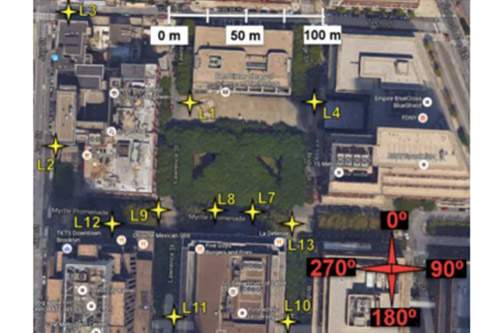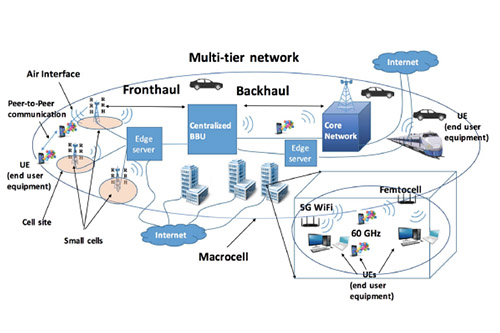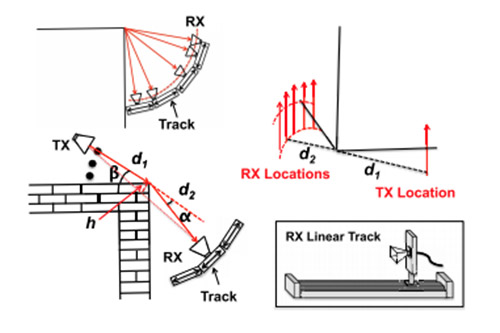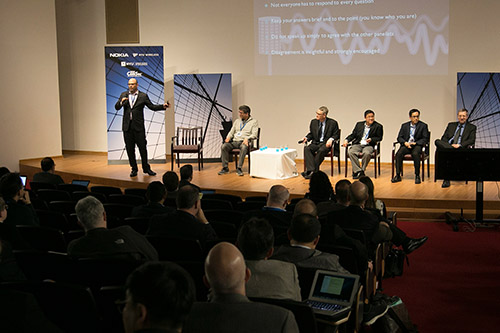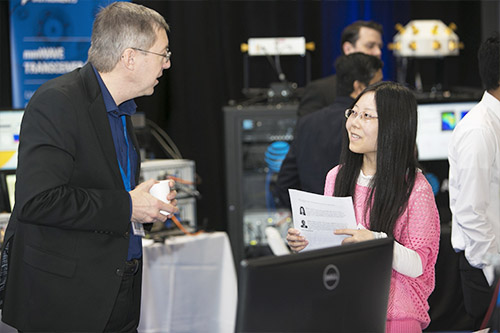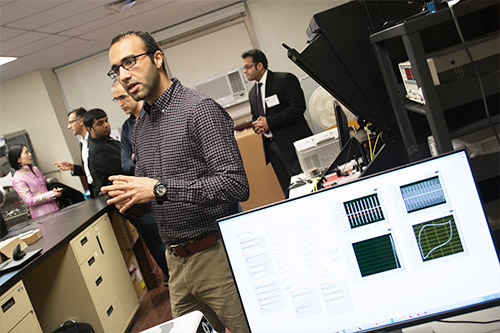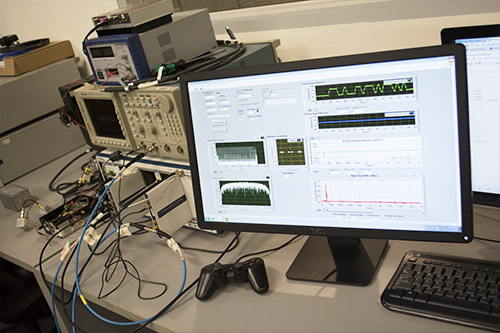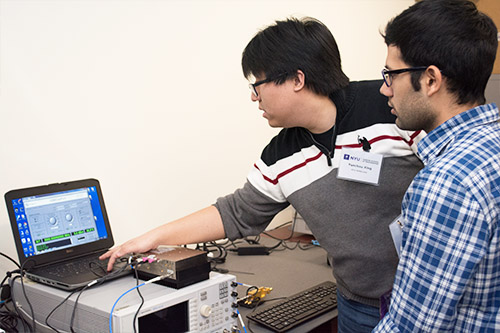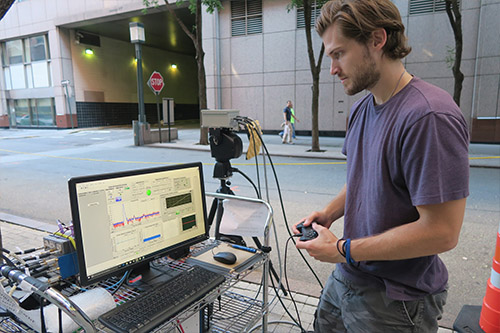10 Brooklyn scientists you should know
In the borough’s universities, but also in its private-sector companies, there are tinkerers, developers and dreamers trying and failing and trying again at learning things previously unknown.
Here are 10 scientists you should check out if you’re unfamiliar with their work:
NYU Wireless’s Shu Sun, with Professor Ted Rappaport. Sun won the Marconi Society’s Young Scholar award. (Courtesy photo)
Ted Rappaport is the head of NYU Tandon’s NYU Wireless team that’s leading the nation in the quest for 5G wireless technology. The effort is experimenting with broadcasting cell-service over a different, higher-frequency (millimeter) part of the electromagnetic spectrum. The so-called 5G cell service promises a future where cell data is so fast, strong and quick, that the equivalent of super-powered WiFi will be all around us, unconstrained by routers and modems and fiber cable.
What that leads to is anyone’s guess, but it would build a foundation upon which augmented and virtual reality could be built, IoT communications made easier and even self-driving cars working better.
Yao Wang and Mei Fu, NYU Tandon lymphedema research
Yao Wang and Mei Fu are from NYU’s Tandon School of Engineering and Rory Meyers School of Nursing. The two have teamed up to use machine learning to fight lymphedema, a disease characterized by the building up of lymph fluid in patients’ limbs.
The problem with lymphedema is that it’s hard to diagnose. By the time a patient or doctor notices one arm is bigger than the other, it’s irreversible. But there are clues about the disease before it reaches that level, and that’s where Wang and Fu’s work comes in. Lymphedema has 22 symptoms, and the more of them patients develop, the more likely it is they have the disease. Using a software program currently under development, Wang and Fu hope to learn which of the symptoms are of more importance, if there are particular combinations of symptoms that show up together and how to diagnose the disease when it’s still early enough to prevent or reverse its damage.
Most of the Suneris team in a 2014 file photo. CEO Joe Landolina is third from right.
Industry City–based Cresilon (formerly Suneris) created Vetigel, a plant-based gel that adheres to the skin of animals and can stop bleeding immediately, and without needing to apply pressure. The product is still going through the regulatory rigors of human use, but the potential of it is enormous, whether it’s on battlefields or in hospitals. Earlier this year, Cresilon ranked as a finalist in Richard Branson’s Extreme Tech Challenge. We ranked the company No. 10 in our list of top Brooklyn startups for 2017.
BioLite’s clean cookstoves reduce emissions by more than 90 percent. (GIF via YouTube)
BioLite is in the business of making fire without smoke. The Dumbo-based thermodynamics startup has two branches: one is consumer-facing and sells camping equipment (such as the FirePit which recently raised $1.2 million and counting on Kickstarter) at places like REI, L.L. Bean and Eastern Mountain Sports. The products are the right combination of useful, innovative and rugged enough to make them about the best Dad-gift you can think of. Its other branch is in the developing world, where it sells stripped-down versions of its stoves at the most affordable possible price. It’s gotten a good deal of funding and grant money toward this less profitable end.
“We hope to take that model [and implement it] across all technologies,” BioLite founder Jonathan Cedar told us last year. “Lighting, power storage, charging, clean water. How do we reinvent these things?”
By generating clean fire and electricity, BioLite attempts to radically decentralize infrastructure. If each individual home can heat itself and generate its own power, that can open up a lot of room for development.
Jeremy McCool, Hevo Power

How it works. (Courtesy image)
Hevo Power has developed a technology to cordlessly charge electric cars by parking them on top of a square in the pavement. It is, as its perfectly-named founder says, the final link in the chain of fully autonomous vehicles. In the future, when driverless cars are running out of juice, they’ll just drive themselves to a charging station, park over the charger and wait till they’re good to go.
HEVO is also a Brooklyn company through and through. In 2012, the company began working with engineers at NYU Tandon on the technology of the wireless power station. The following year, it was accepted into the NYU Urban Future Lab, in Downtown Brooklyn, and in 2016 it made the jump to its own manufacturing space in Red Hook.
We ranked HEVO at No. 9 in our list of top Brooklyn startups.
Voltaiq
These things are gonna power the future.
The biggest problem with solar energy is that it only works when the sun’s out. That’s why batteries are important (and why Elon Musk is obsessed with them). This Downtown Brooklyn–based battery startup builds software to make batteries work more efficiently and longer. Voltaiq raised $2 million last year.
“There’s going to be tremendous growth in the electrification of our economy as we move away from fossil fuel growth,” Voltaiq cofounder Tal Sholklappertold us last November.
Tinia Pina, Re-Nuble
Headed by Tinia Pina and based out of Brooklyn Navy Yard incubator 1776, Re-Nuble makes chemical-free fertilizer out of organic food waste for hydroponic farms. The idea is that so much potential fuel is lost to landfills that could better be used to help new plants grow. With more and more farming happening indoors, and often in the absence of soil, Pina created three fertilizer products for both indoor and hydroponic farming.
Erum Azeez Khan, Memory Lane
Formerly known as Hacking Alzheimer’s and also based out of 1776, Memory Lane uses voice technology to aide seniors with Alzheimer’s. With Memory Lane’s application, users can listen to audio recordings of historical events and loved ones can record family histories and stories for the user to listen to and hopefully recall memories otherwise lost. The company was founded by Erum Azeez Khan, who was nominated in our own Brooklyn Innovation Awards as Scientist of the Year in 2017.
Ellen Jorgensen, Biotech Without Borders

Ellen Jorgensen in the Genspace lab. (Photo by Tyler Woods)
The previous director of Genspace and current organizer of Biotech Without Borders, Ellen Jorgenson has been a fixture in the Brooklyn science world for quite some time, bringing into the fold people with a curiosity in science and tinkering, especially on the topic of CRISPR. At Genspace, Jorgensen led a community bio lab with programming that was often free and open to the public, allowing people to get hands-on experience in real biology. Now with Biotech Without Borders, she’s building a scientific community with speakers and pizza.
Andrew Ochoa, Waverly Labs
Waverly Labs founder Andrew Ochoa in the company’s Indiegogo video.
What if you could talk to anyone from anywhere in the world? That’s the goal of Waverly Labs, a New Lab–based startup building an in-ear, real-time translator. Ochoa had the idea for the real-time translator when he met a French woman but had trouble communicating (she makes an appearance in the devices’s IndieGoGo video). The product combines souped-up earbuds with a phone app, allowing the receivers and transmitters to communicate. This spring, Waverly Labs recorded $5 million in preorders for its product.

 2026 Open House
2026 Open House 2025 Brooklyn 6G Summit — November 5-7
2025 Brooklyn 6G Summit — November 5-7 Sundeep Rangan & Team Receive NTIA Award
Sundeep Rangan & Team Receive NTIA Award